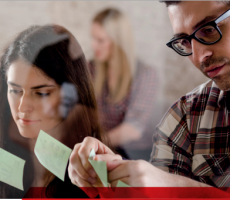March 9, 2016
Corporate real estate strategy shifts focus from cost to people 0
 A new survey of corporate executives indicates a major shift in how companies make real estate decisions today, with more than half (50 percent) saying that talent is more important than cost (31 percent) as their foremost consideration. As a result, executives view the workplace as primarily a recruitment and retention tool that offers attributes such as a flexible workplace, high quality amenities and interiors. But while the people and workplace experience dominate the corporate real estate agenda, according to CBRE’s Americas Occupier Survey – escalating costs are a major concern. Of survey respondents, 85 percent cite space efficiency and restructuring as a top strategy for reducing occupancy costs. These two issues are driving real estate conversations; with the result that workplace strategy is increasingly being viewed as both a critical employee attraction and retention strategy (57 percent), and as a means to control costs.
A new survey of corporate executives indicates a major shift in how companies make real estate decisions today, with more than half (50 percent) saying that talent is more important than cost (31 percent) as their foremost consideration. As a result, executives view the workplace as primarily a recruitment and retention tool that offers attributes such as a flexible workplace, high quality amenities and interiors. But while the people and workplace experience dominate the corporate real estate agenda, according to CBRE’s Americas Occupier Survey – escalating costs are a major concern. Of survey respondents, 85 percent cite space efficiency and restructuring as a top strategy for reducing occupancy costs. These two issues are driving real estate conversations; with the result that workplace strategy is increasingly being viewed as both a critical employee attraction and retention strategy (57 percent), and as a means to control costs.


































January 8, 2016
The six things all people need from their workplace 0
by Jane Kendall-Bush • Comment, Facilities management, Knowledge, Workplace design
(more…)